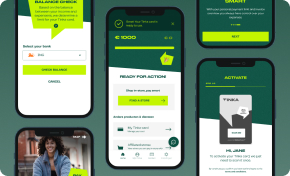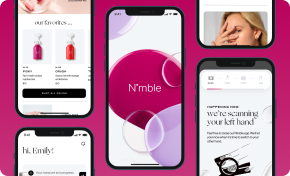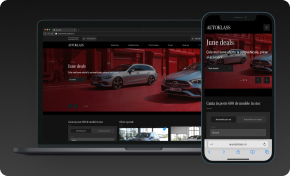In an age where our phones are practically extensions of ourselves, the significance of Mobile App Development cannot be understated. Businesses everywhere are recognizing the need to tap into the massive potential of mobile platforms. Welcome to the digital frontier, where a strong online presence starts with a great website but thrives with the right app strategy. Today, we delve into how this game-changer can significantly elevate your Conversion Rates: mobile apps.
The idea is simple, yet powerful. A well-designed mobile app not only boosts your brand’s visibility but also serves as a direct pipeline to customer engagement. Stick around to find out how diving into the mobile app space can supercharge your conversion rates and offer a richer user experience.
The Shift to Mobile and the Rise of Mobile App Development
According to Statista, by the end of this year, the global count of mobile users is projected to reach 4.88 billion. Furthermore, mobile devices, excluding tablets, are anticipated to account for 60.6% of global internet usage. These statistics underline a significant shift in consumer behavior, reflecting a transition from traditional desktop usage to mobile platforms.
For businesses, this development isn’t just a trend—it emphasizes the pivotal role of mobile app development in the modern digital landscape. The statistics suggest that a significant segment of potential consumers now predominantly browses the internet on their mobile devices. Crucially, this mobile-centric audience plays a vital role in boosting conversion rates, presenting businesses with a golden opportunity for revenue generation.
In summary, mobile platforms are not merely an emerging trend but rather a dominant medium through which consumers interact with digital content. Failure to adapt to this change equates to missing out on a valuable avenue for customer engagement and conversions.
Customized Mobile Apps to Elevate Your Business
Building Mobile Apps that Bridge Your Business with Your Audience
Explore Mobile App DevelopmentBetter User Experience, Better Conversions
The relationship between user experience (UX) and conversion rates is more than just theoretical; data prove it. For instance, Localytics reports that mobile apps convert 160% more users than mobile browsers and 43% more users than desktops. These statistics highlight the compelling advantage of mobile apps in driving conversions.
Further emphasizing the value of mobile platforms, Statista data indicates that Android conversion rates across all mobile app categories were 2.57% in October 2022 and increased to 2.95% by April 2023. This upward trend suggests a consistent growth in the effectiveness of mobile apps in achieving higher conversion rates.
So why do mobile apps outperform other platforms? One reason is the highly focused design that mobile apps offer. Unlike websites that must accommodate various browsers and devices, mobile apps are tailored for specific platforms, such as iOS or Android. This focus allows for quicker load times and more intuitive navigation. Google research shows that 53% of mobile users will abandon a site if it takes more than three seconds to load, emphasizing the importance of speed in user retention and conversion.
A well-designed app reduces the cognitive load on the user. An intuitive interface means users spend less time navigating the app and more time engaging with your product or service. This ease of use is not just a bonus; it’s a critical factor contributing to higher engagement and, ultimately, increased conversions.
The superior user experience provided by well-designed mobile apps is not a luxury but a critical component for any business aiming to improve its conversion rates significantly.
Design for Success with Stunning UX/UI From Our Team
Investing in UX Design Can Yield a Return of Up to $100 for Every $1 Spent
Discover UI/UX DesignPush Notifications: A Game Changer
Push notifications aren’t just a feature you can overlook; they’re an engagement powerhouse. With a staggering 90% opening rate and a click rate that’s seven times higher than email marketing, it’s clear why businesses are flocking to adopt this tool. Implement push notifications to increase your user engagement and conversion rates dramatically.
Did you know that enabling push notifications can skyrocket your app engagement by 88%? Moreover, the odds of users returning to your app within 30 days jump to 65%. Frequent engagement is more than a vanity metric; it’s a direct avenue to increased conversions. Users who have push notifications turned on are engaged in at least 11 app sessions per month—a stark contrast to those who don’t enable notifications.
When to send these notifications? The sweet spot is between 10 am and 1 pm. Time your push notifications effectively for the highest click-through rates. A little personalization can go a long way too. Users are likelier to click through if the notification is relevant and timely.
Depending on your industry, the effectiveness of your push notifications can vary. News apps experience the highest click-through rates, closely followed by entertainment apps. Want to add a little zest to your messages? Emojis can enhance click-through rates by nearly 10%. Tailor your push notifications to your industry and don’t hesitate to use emojis for that extra punch.
Push notifications are a robust tool for sustaining user engagement and significantly boosting your conversion rates. They offer a direct and personalized communication channel with your users, a channel that should be noticed.
Personalization: Speak Their Language
Personalization isn’t just a nice-to-have in today’s digital age—it’s expected. Casual browsers can quickly become engaged customers when an app speaks directly to their needs and preferences.
For example, consider implementing data-driven algorithms to offer personalized recommendations. This is more than merely a clever feature. The same strategy makes platforms like Amazon irresistibly effective at driving purchases.
People don’t just want a one-size-fits-all experience; they want to feel understood. By using personalization features from the first user interaction, you’re more likely to see an uptick in customer satisfaction by 20%, which can yield a 15% increase in overall conversions. That’s not a subtle shift; it’s a game-changer.
However, personalization doesn’t stop at the individual. You can and should go bigger. Data analytics tools allow you to track user behavior and preferences, providing the insights needed to segment your audience into different user groups. Tailoring your marketing messages and product recommendations to these specific groups will increase engagement and improve conversion rates.
Global reach? Even better. You can just localize your app to speak to different cultures and languages. Translating your app can significantly improve your user base and, consequently, your conversion rates.
Personalization is not just an optional feature but a cornerstone of effective mobile apps. With a more tailored approach, you can transform casual browsers into committed customers, thereby maximizing your conversion rates.
Custom Software Development for a Competitive Edge
Build Unique Software Solutions with Our Expertise
Explore Custom SoftwareEnhanced Analytics: The Blueprint for Success
Data is your most reliable guide. But not just any data—targeted, actionable analytics that can inform your business decisions and sharpen your conversion strategies.
Take, for example, the feature of in-app analytics. These are not just numbers and graphs to glance over. They offer a snapshot of user behavior, track engagement, and even flag areas of the app where users drop off. By understanding these metrics, you can directly address issues and continually optimize your app for higher conversions. Make in-app analytics your daily check-in to understand your audience better and optimize user experience.
Real-time data is another potent tool in your arsenal. Why wait for weekly or monthly reports when you can monitor user behavior as it happens? This immediacy allows for more agile business decisions. If you see a sudden surge in usage or engagement for a particular feature, you can immediately capitalize on that trend. Use real-time analytics to adapt your business strategies on the fly.
Don’t forget about customer feedback. While analytics can provide a lot of quantitative data, direct user feedback offers qualitative insights that are equally valuable. Create in-app surveys or feedback forms to gather this information. After all, who better to tell you what’s working and what’s not than the users themselves? Regularly collect customer feedback for a more well-rounded understanding of what drives conversions.
Enhanced analytics provide the framework for a data-driven approach to increasing your mobile app’s conversion rate. They give you a comprehensive understanding of user behavior, enabling you to adapt, evolve, and—most importantly—succeed in today’s competitive marketplace.
Streamlining Your Path to Effective Product Discovery
Make Your Ideas a Reality in Four Weeks with Our Results-Driven TechBoost Program
See Product Discovery ServicesOffline Capabilities: Uninterrupted Engagement
The best mobile apps offer more than just an online experience; they deliver value even when users aren’t connected to the internet. Offline capabilities aren’t just a bonus feature; they’re a vital part of ensuring uninterrupted engagement, which is a cornerstone of boosting conversion rates.
Imagine a user browsing your retail app while on a subway with spotty internet coverage. If your app is built to function offline, that user can continue to browse products, read reviews, or even add items to a wishlist. Incorporate offline capabilities into your app’s design to reduce user drop-offs in areas with poor connectivity.
Offline capabilities also offer another avenue for data collection. User interactions performed offline can be stored and uploaded when the device reconnects to the internet, giving you valuable insights into user behavior even when not online. Use offline data collection to supplement your analytics and offer a more personalized user experience.
These offline features don’t just improve user experience; they also increase opportunities for conversion. When users are able to interact with your app at any time and in any place, the barriers to conversion are significantly reduced.
Don’t Miss Out on Maximizing Conversions
In today’s highly competitive landscape, merely having a mobile app is not enough. To truly maximize conversion rates, your app needs to offer more than just a sleek design or basic functionality. It needs to engage users meaningfully, provide a seamless and personalized experience, and deliver value beyond the online world.
From leveraging real-time analytics and incorporating push notifications, to offering a personalized user experience and ensuring offline capabilities, the elements we’ve discussed are not just features but essentials. They represent a multi-faceted approach to not only meet but exceed user expectations, leading to higher levels of engagement and, ultimately, higher conversion rates.
What are your next steps? Review your current app’s features and assess where you can integrate these essential elements. A focused, user-centric strategy is your ticket to conversion rate success in the mobile app world.
IT Consultancy for Strategic Advantage
Tailored IT Solutions to Drive Your Business Forward
Discover IT ConsultingThe future is mobile, and it’s high time your conversion rates reflect that.
Ready to Boost Your Conversion Rates?
If you’re ready to take your mobile app to the next level and significantly improve your conversion rates subscribe to our newsletter. Our team at HyperSense is here to provide expert consultancy and development services tailored to your specific needs. Contact us today to get started on your path to mobile app success!










